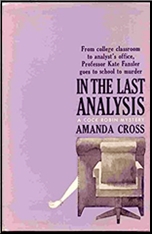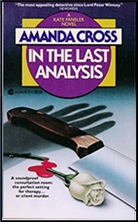Thu 23 Dec 2021
A 1001 MIDNIGHTS Review: AMANDA CROSS – In the Last Analysis.
Posted by Steve under 1001 Midnights , Reviews[6] Comments
by Susan Dunlap
AMANDA CROSS – In the Last Analysis. Macmillan, hardcover, 1964. Avon, paperback, 1966. Fawcett, paperback, 2001.

Amanda Cross is a pseudonym of Carolyn Heilbrun, a professor of English at Columbia University, and the play on words in the title of this novel is just what a reader might expect from one in that academic field. In the Last Analysis refers both to the analysis of a murder and to the fact that the murder was committed on a psychiatrist’s couch.
Cross’s heroine, Kate Fansler, is also an English professor, and these popular books have fostered an interest in what might be considered a subgenre: the academic mystery. Words are indeed important to the characters in the Fansler books:
They consider their words; they choose them with care; they admire the skill of other speakers; they are witty; they toss in quotations from a variety of authors. Not only Kate but other characters have a quoting familiarity with literature, and these quotes and their sources can be clues. For anyone who enjoys literature and finds pleasure in the exquisite tum of phrase, the Fansler series is a treat.

Kate Fansler is described as a young woman, but she has the assurance of a more mature individual. She is the only daughter of an old New York family, in which her much older brothers did the “respectable” thing and went into business while Kate — black-sheepishly — opted for academia. In an even more rebellious manner, Kate has also opted for solving murders.
In In the Last Analysis, Kate refers a young woman student to psychoanalyst Emanuel Bauer, who was once Kate’s lover before his marriage. The student is killed — on Bauer’s couch, in his soundproof consultation room. As the doctor’s office is in his home, not only he but also his family are suspect. As — for various reasons — is Kate.
Her investigation includes forays into the private lives of the Bauer and Fansler families (members of the latter seem to be surrounded by a lot of heavy mahogany furniture), as wen as less upstanding members of the academic establishment.
Kate’s investigation — and its tidy solution — is on a par with the others in this extremely literate series, which includes The James Joyce Murder (1967), Poetic Justice ( 1970), and The Question of Max (1976).
———
Reprinted with permission from 1001 Midnights, edited by Bill Pronzini & Marcia Muller and published by The Battered Silicon Dispatch Box, 2007. Copyright © 1986, 2007 by the Pronzini-Muller Family Trust.
December 23rd, 2021 at 9:01 pm
I was a fan of Cross and Fansler. A literate and well written series over all that worked both as a mystery and something a bit smarter than usual.
December 23rd, 2021 at 10:51 pm
The last time I read one, she was a little too literate for me. I don’t know which one it was, because I didn’t finish it. It may have been one of her later ones, and I suspect I felt that the detectiving was taking second place to the real story she was telling.
December 23rd, 2021 at 11:24 pm
A snob read.
December 24th, 2021 at 5:30 am
I like her work (apart from some of the last ones) and I refute the implication of the last comment. You are entitled not to like what she writes, but not to make remarks which are derogatory about those who disagree with you. Please think about what you’re saying in future.
December 24th, 2021 at 10:38 am
I always think about what I’m saying or writing, do the same.
December 25th, 2021 at 10:08 pm
Absolutely a “snob read”, and at her best a good one, though I agree toward the end she wasn’t as good as the early ones failing in being consistent on the mystery element.